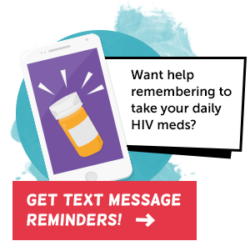What exactly does “treatment” mean for HIV-positive guys? Why is it important to start early?
When we talk about treatment, we’re talking about the various medications you might take to help treat HIV. It’s important to get connected to HIV care, because left untreated, HIV can cause more serious health problems. Working with a doctor to decide on a treatment plan can help you live a longer, healthier life.
New research has shown that one of the biggest factors in the long-term health of a guy with HIV is getting connected to care as soon as possible after acquiring HIV. By talking to a doctor and learning about treatment options, guys can make decisions about the best treatment plan for them.
Here are a few things to know about treatment for HIV-positive guys:
 Medication
Medication
HIV medication needs to be taken for life. Starting treatment is an important step in living with HIV, so it’s important to discuss your options and your readiness for treatment with an experienced HIV provider. The combination of medications used to treat HIV are known as antiretroviral therapy (ART). There are a lot of different variations of these drugs available today. Current HIV meds are often available to take as a single daily pill, and have fewer side-effects than drugs used in the past. CATIE has lots of information about these different options. It’s possible that new treatments, including injectables or drugs taken less frequently will be available in the future.
 Reduce your viral load
Reduce your viral load
Treatment can also significantly reduce viral load, and reduce the chance of HIV transmission during sex. Most people can reach an undetectable viral load within a few months of starting treatment if they take their medications regularly and follow their doctor’s recommendations. Generally, guys can rely on this to help prevent HIV transmission after about six months of maintaining an undetectable viral load, which can be demonstrated through two or three viral load tests.
It’s always best to talk to a doctor or care provider experienced with HIV care about how viral load fits into your approach to sexual health. Contact the Ontario Sexual Health Infoline by calling 1-800-668-2437 to find an HIV care provider nearest to you. If this isn’t an option where you live, getting educated through websites like CATIE and NAM can help you advocate for yourself.
 Start treatment early
Start treatment early
It’s important to connect to care early and decide on a treatment plan if you are diagnosed with HIV. Early HIV treatment reduces the chance of any HIV related health complications, and will put you on a path to being undetectable. The most recent research, including the START study, strongly suggests that the earlier you start treatment, the better your health outcomes tend to be. HIV is also most likely to be transmitted right after someone acquires HIV, when viral load is highest in the body. It is always up to the individual to decide when they are ready to begin a daily regimen of taking medications. Connecting to experienced HIV care providers can help you make that decision.
 Adherence
Adherence
Stick to your treatment plan. HIV medications need to be taken every day as directed to be effective. Once you begin treatment, regular visits with a doctor who you trust and who is knowledgeable about HIV will help you stick to your plan.
Taking meds exactly as a doctor says to is the best way to avoid any problems, because HIV can sometimes grow resistant to the meds you’re using if you’re not following the routine. When HIV becomes resistant, those medications may no longer be as effective. This can result in a guy having fewer treatment options over time.
If you are experiencing challenges around taking your medications consistently, you have support options. Try setting alarms in your phone, using a calendar, or setting up text message alerts with our medication reminder tool.
Some people find pill organizer cases helpful. Post-it notes in conspicuous places in your apartment, recording your doses, carrying extra pills around with you, or flipping your pill bottle upside down every day once you’ve taken your meds can also be useful strategies. Talk to your doctor, pharmacist, or reach out to your local HIV/AIDS service organization for more help.

